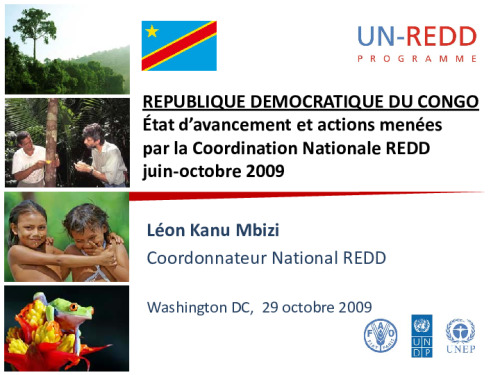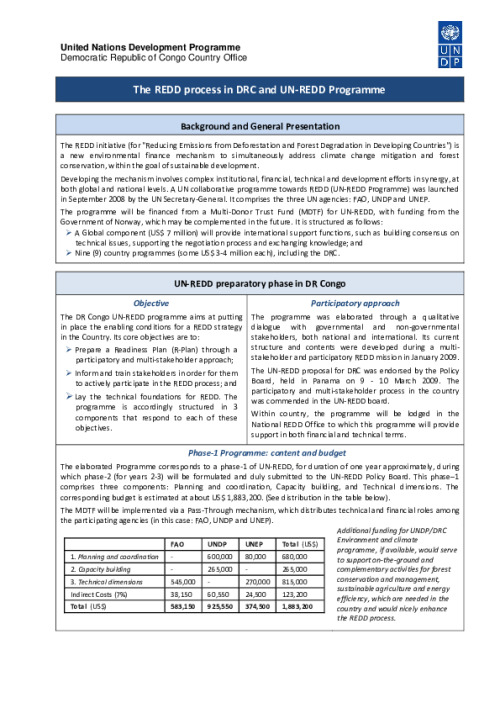Africa
Democratic Republic of the Congo (the)
Facts and Figures
DRC is located at the heart of the Congo Basin, home to the second largest tropical forest in the world. Aware of the great potential for REDD+ in the country, DRC has forged ahead with both the planning and implementation stages of REDD+ preparedness. The initial DRC National Programme, which helped launch and structure the country’s national REDD+ strategy, became a full National Programme (Readiness Plan) after being approved by the UN-REDD Programme Policy Board in March. DRC’s National Programme document was signed in October and funds were disbursed in November, marking the official launch of the country’s UN-REDD Programme.
As DRC’s National Programme is now underway, activities have moved from strategic planning to results, including the completion of key studies, testing of REDD+ pilot projects, training of personnel, knowledge-sharing at a regional level, the completion in-country consultation processes and the launch of the country’s first university curriculum on REDD+.
Progress against the Warsaw Framework for REDD+
Building on DRC’s results under the National Programme (completed in 2013) and ongoing Tier 2 activities, targeted support has been provided to the country on meeting specific support gaps in 2012-2015. Lately DRC was supported on SIS and a presentation of the country approach to safeguards at COP21, and on the submission to the UNFCCC of
the FREL/FRL draft methodology in time for COP21, including a demonstration activity with the Carbon Fund of FCPF. UN-REDD and FCPF have worked on a harmonized approach on the various REDD+ safeguards frameworks developed in DRC, clarifying how the national standards can be applied through REDD+ implementation. The country is also benefitting from the CBR+ initiative.
National REDD+ Strategy/Action Plan
Past targeted support led to a review of DRC’s legal framework in relation to REDD+ implementation with proposal of legal amendment to recognize eligible REDD+ projects. The National REDD+ process has included gender consideration, focusing on best practices in strategic sectors. A Gender Analysis on REDD+ was completed in December 2013.
National Forest Monitoring System (NFMS)
In 2015, targeted support helped finalize the forest cover change assessment for the 1990-2010 period. Additionally, the fieldwork of the pre-national forest inventory was completed, providing carbon estimates for about 50 sampling plots and covering most provinces of the country. Capacity has also been raised on GHG inventories through trainings and the GHG inventory database for the agriculture, forestry and other land use sector was updated. Work on institutional arrangements for enhancing data accessibility between institutions has resulted in the review of legal options to stimulate data sharing.
Forest Reference Emission Level / Forest Reference Level (FREL/FRL)
In 2015, targeted support was provided for the development of the FREL/FRLs draft methodology for the DRC, which was presented during COP21. The forest cover change statistics were for the period 1990-2010 were finalized and new work was launched to include the years 2000 and 2014.
Safeguards and Safeguards Information System (SIS)
The country field tested in 2015 the social and environmental standards for REDD+ and final outcomes will be validated at a national workshop bringing together stakeholders from all the relevant sectors. A joint training by FCPF and the UN-REDD Programme on Social and Environmental Impact Assessments was an opportunity for the initiatives to work on a harmonized approach on the various REDD+ safeguards frameworks developed in DRC, clarifying how the national standards can be applied through REDD+ implementation. The national safeguards approach was presented at the Rio Conventions Pavilion at COP21. Targeted support also resulted in the finalization of a feasibility study for an economic valuation of REDD+ multiple benefits with steps agreed for integration of the studies’ results into the government’s 2035 strategy development. An expert meeting held on the revision of the REDD+ national standards, followed by training to develop and improve indicators for the standards.
CBR+
Following DRC’s approval of its CBR+ Country Plan, a series of local and national consultations and trainings were held, and the call for proposals issued in March 2015., the CBR+ National Steering Committee selected a first set of five CBR+ projects in July 2015 and a further eight projects were approved in November 2015. These projects focus on improving the understanding, engagement and participation of local communities and indigenous peoples in the REDD+ process. At the community level, the CBR+ grants are supporting practical activities including regeneration of degraded forest ecosystems, promotion of agroforestry and sustainable agricultural practices, distribution of stoves to reduce pressure on community forests from fuel wood collection; and participatory mapping to improve the sustainable management of community forests and help local communities secure their tenure.
Key documents
Focal points
Pagination
- Previous page
- Page 4








